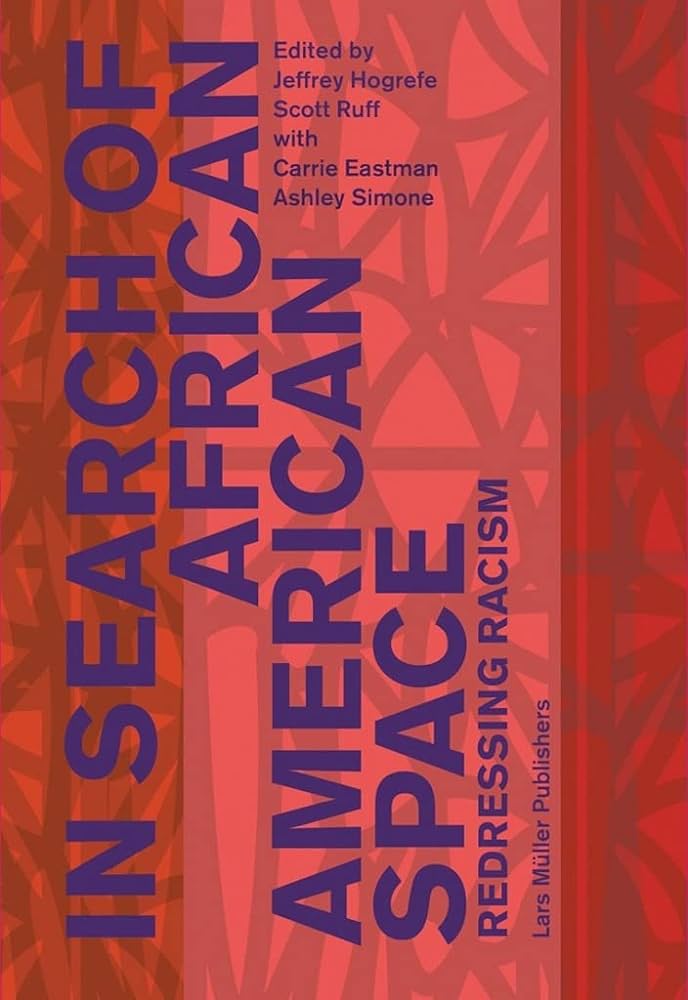Books & Magazines : Art & Politics
In Search of African American Space
$30
Edited with text by Jeffrey Hogrefe, Scott Ruff, Carrie Eastman, Ashley Simone. Foreword by Tina M. Campt. Text by Sara Caples, Radiclani Clytus, Yolande Daniels, Ann Holder, Everardo Jefferson, Walis Johnson, Elizabeth Kennedy, Rodney Leon, Marisa Williamson.
Drawing on architecture, performance art, history and visual theory, In Search of African American Space explores the creative relationship between the African diaspora and social space in America.
Richly illustrated with vintage adverts, maps, posters and architectural plans, and organized thematically, this anthology, edited by Jeffrey Hogrefe and Scott Ruff at the Pratt Institute in New York, is divided into three sections. The anthology is organized thematically, presenting African American space in a broad cultural context. The section “The Monument, Memorial, and Mundane,” explores the analytical methods of architects Scott Ruff, Yolande Daniels, Rodney Leon, Elizabeth Kennedy, Sara Caples and Everardo Jefferson, who have dedicated their studies and practices to examining spatial typologies related to the African diaspora. As architects working directly in the afterlife of slavery, conscious of spatial performances of opposition in relationship to architecture, they introduce their own interpretations of African American space from their personal experiences and a dedication to an aspect of practice that has been operating largely outside of the academy.
The section “Politics without a Proper Locus” contextualizes the development of African American space in everyday practices that arose in the antebellum period and beyond, among enslaved persons on plantations and the growing population of freed Africans in urban settlements in the North and South. The section title derives from Saidiya Hartman’s influential engagement with French theorist of space Henri Lefebvre in the classic 1997 book Scenes of Subjection. The authors present the everyday practices of “vernacular citizenship,” as characterized by Pratt Institute scholar Ann Holder, that emerged among the enslaved, the formerly enslaved and their allies in the years before and after Emancipation to cast a light on responses to the inevitable African American experience of hypervigilance. The oppositional performances of African Americans are at the foundation of a search for African American space—a space that is continually erased by the state apparatus.
Details
- Format: Paperback
- Pages: 256
- Dimensions: 6x8 inches
- Date: September 2020
Shipping
You have three shipping options at checkout:
- Best Way: Your order will ship within two business days via UPS or USPS priority or first class, depending on the size and weight of your package.
- 2-Day Express: Your order will ship the following business day via FedEx or UPS 2-Day Express.
- In-store Pickup: Add items to your cart and proceed to checkout – there, select Local Pickup in Shipping Options. Once your order is ready to be picked up, you will be notified by email.
Once all of your items are ready for pickup and you've received your Ready for Pickup notification (remember: don't come to the store unless you've received this).
To collect your in-store pickup order once you have received the "Ready for Pickup" notification, please come to the Shop (located in the main lobby off Vineland Place) during the Walker Art Center's open hours. We are currently unable to do curbside pickup.
Shipping rates depend on the selected shipping speed and weight/size of the items. Please allow several days for your order to be processed and shipped.
If you have any additional questions please contact shop@walkerart.org.

